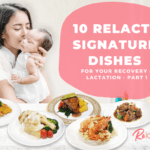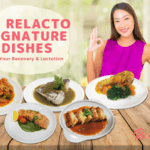3 Ways Your Diet Can Affect Your Breast Milk
Being properly nourished after your childbirth should be one of your main priorities. This is important because nourished well supports your recovery and lactation. Being malnourished may delay wound healings, postpartum recovery process subsequently making you highly susceptible to falling sick, which may affect your ability to breastfeed your little one. This condition, if left untreated, would have a significant impact not only on your physical health, it will affect your mental health and your baby too. With that said, how would you be able to overcome this issue? We understand how challenging it is to be in your shoe. Therefore, we have gathered a few tips on supporting breast feeding through your diet for your convenience! You might want to read until the end.
Your Diet and Breast Milk Supply
Your breast milk is uniquely tailored to your baby’s needs. The needs of one baby to the other may not be exactly the same from day to day. Therefore, a good supply of breast milk can look different from one mother to the other. However, we all know that establishing a good supply of breast milk is one of the most common concerns for mothers. Fortunately, our body is designed in such a way to support our child’s needs even if our diet may not be consistently optimum. Nevertheless, we understand if you want to cover all your bases and have foods that could help with breast milk supply.
Evidence is scarce, but there are some foods that are traditionally believed to help boost breast milk supply. These lactogenic ingredients are both tasty and healthy for you to choose from. The best part about these ingredients? Beyond just possibly boosting breast milk supply, these foods are here to nourish you too! Some of the lactogenic ingredients that you can incorporate into your daily confinement diet are papaya, fennel, fenugreek, ginger, garlic and moringa oleifera.
Having meals that contain ginger may help to improve your supply of breast milk supply. The theory is that ginger encourages the production of breast milk by improving your blood flow. On the other hand, papaya is beneficial for your breastfeeding purpose as it encourages your milk production by stimulating the smooth muscles that work to express your breast milk better. Foods that contain moringa oleifera boosts your milk supply through improved secretion of milk and by stimulating the hormones involved in your milk production.
Other theories are foods that are rich in fennel improve your breast milk supply by reducing the inhibitory of other hormones on your breast milk production. This will ensure a better and smooth milk flow for your baby. You might want to start having all of these ingredients in your kitchen soon!
Your Diet and the Nutritional Density of Breast Milk
Your diet is able to directly influence certain (not all) key nutrients in your breast milk. Therefore, getting the right foods should rank at the top of your priorities because your little bundle of joy’s primary diet depends on your breast milk. Now that we have mentioned its importance, what are the foods you should have in your confinement diet?
Breast milk nutrients that are affected by your daily diet are types of fat (Omega 3), choline, iodine, vitamin D, vitamin B12 and vitamin A. These nutrients can be found in oily fish like salmon, eggs, green leafy vegetables, carrot, pumpkin, chicken, meat, shiitake mushroom and many more. These foods are not only healthy and tasty but they are also widely accessible and available.
The fact that they are easily available in any dishes showcases their flexible properties. This makes the aforementioned foods a good breastfeeding meal plan for you. Not only do they help in improving the nutritional value of your breast milk , they nourish and support your postpartum recovery.
How would these foods aid your cause? For instance, foods like salmon, eggs, chicken and meat are rich in protein that are great for you as they provide the building blocks to repair and encourage wound healing. Protein-rich foods are also essential to develop antibodies that are part of setting up a good immune system. Besides that, incorporating foods that are rich in vitamin D helps to support an optimal immune system too! Adequate vitamin D also supports good bone health for you and your little one.
Your Diet and the Taste of Breast Milk
This might be news to some mommies but did you know that the taste of your breast milk and amniotic fluid is influenced by your diet? Therefore, if you’re eating similar foods during postpartum as you were during pregnancy, your baby will feel comforted by the scent and taste of your breast milk as it raises their sense of familiarity with you. Each mom has a breast milk taste and scent that is unique to their own, and that includes you too!
Although limited, recent researches found that there is a possibility on how foods eaten by a mother during her pregnancy and lactation period may potentially influence her little one’s food preferences during weaning and early childhood. Therefore, mothers eating a healthy and balanced diet filled with sufficient fruits and vegetables since pregnancy onwards may help to develop their child’s taste palette for such foods even if it’s bitter as they grow up. They could possibly be less picky too!
Some research has found foods like garlic to be great for improving the taste and odour of your breastmilk. Consuming it would affect the odour of your breast milk. Observations showed that this would encourage your baby to latch on longer and feed more vigorously. However, do keep in mind that repeated exposure to garlic flavour in your milk will make your baby become habituated to it. Thus, garlic flavours only influence infant suckling during initial exposure. Sounds like a must-have ingredient in your meals!
In conclusion, practising a well-balanced diet does have its perks in improving the quantity and nutritional density of your breast milk. Your baby will be pleased and thankful for this progress!
Interested in more information on breastfeeding and lactogenic ingredients? You can contact us at +65 6360 1000!







